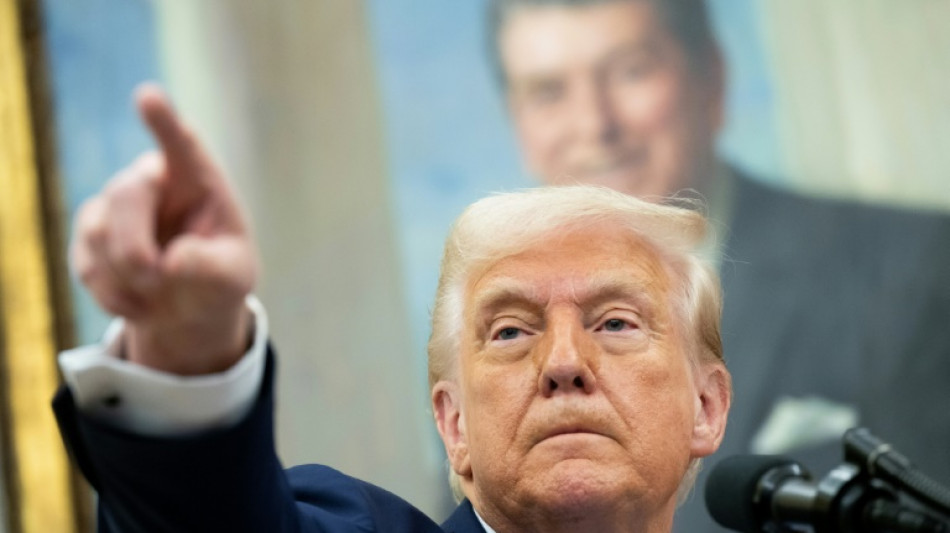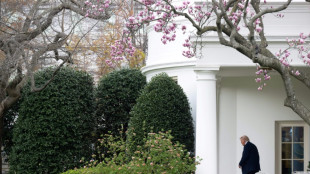

World economies brace for Trump tariffs ahead of deadline
World economies were jittery Monday ahead of US President Donald Trump's "Liberation Day" when he is set to unleash tariffs against multiple countries, risking global turmoil to redress what he says are unfair trade imbalances.
Trump -- who has been making unprecedented use of presidential powers since taking office in January -- is set to announce Wednesday exactly what tariffs will be imposed and whether they will target entire sectors.
The uncertainty is already roiling markets, with the tech-focused Nasdaq Composite Index plunging more than 2.0 percent in New York.
Trump insists that reciprocal tariffs are needed because the world's biggest economy has been "ripped off by every country in the world." But critics warn that the strategy risks a global trade war, provoking a chain reaction of retaliation by major trading partners like China, Canada and the European Union.
Market jitters intensified after Trump over the weekend said his tariffs would include "all countries."
The Wall Street Journal reported Sunday that advisers have considered imposing global tariffs of up to 20 percent, to hit almost all US trading partners. Trump remained vague, saying his tariffs would be "far more generous" than ones already levied against US products.
- 'Economic pain' -
Trump's fixation on tariffs is already fanning US recession fears. Goldman Sachs analysts raised their 12-month recession probability from 20 percent to 35 percent.
This reflects a "lower growth forecast, falling confidence, and statements from White House officials indicating willingness to tolerate economic pain." Goldman Sachs also lifted its forecast for underlying inflation at end-2025.
Already, China and Canada have imposed counter-tariffs on US goods, while the EU unveiled its own measures due to start in mid-April. More countermeasures could come after Wednesday.
Ryan Sweet of Oxford Economics said to "expect the unexpected," anticipating that Trump would "take aim at some of the largest offenders."
What matters ultimately is how broad-based Trump's tariffs are and whether the tool is merely a negotiating tactic or part of a regime shift, he said.
Besides reciprocal country tariffs, Trump could also unveil additional sector-specific levies on the likes of pharmaceuticals and semiconductors.
He earlier announced auto tariffs to take effect Thursday.
Economists have expected the upcoming salvo could target the 15 percent of partners that have persistent trade imbalances with the United States, a group that US Treasury Secretary Scott Bessent called a "Dirty 15."
The United States has its biggest goods deficits with parties including China, the EU, Mexico, Vietnam, Taiwan, Japan, South Korea, Canada and India.
- 'Existential moment' -
US trade partners have been rushing to minimize their exposure, with reports suggesting India might lower some duties.
European Central Bank President Christine Lagarde said Monday that Europe should move towards economic independence, telling France Inter radio that Europe faces an "existential moment."
Separately, British Prime Minister Keir Starmer spoke with Trump in "productive negotiations" towards a UK-US trade deal, his Downing Street office said Sunday.
And German Chancellor Olaf Scholz said the EU would respond firmly to Trump's tariffs, although stressing that the bloc is open to compromise.
It is "entirely possible" for fresh tariffs to be swiftly reduced or put on hold, said Greta Peisch, partner at law firm Wiley Rein.
In February, steep levies on Mexican and Canadian imports were paused for a month as the North American neighbors furthered negotiations.
"There are many different scenarios: delays while talks continue, potential reductions or tariffs being put in place immediately," said Peisch, a former official at the US Trade Representative's office.
P.Claes--JdB



